The Google Nexus 9 Review
by Joshua Ho & Ryan Smith on February 4, 2015 8:00 AM EST- Posted in
- Tablets
- HTC
- Project Denver
- Android
- Mobile
- NVIDIA
- Nexus 9
- Lollipop
- Android 5.0
CPU Performance
While Denver’s architecture is something fascinating to study, it’s important to see how well this translates to the real world. Denver on paper is a beast, but in the real world there are a number of factors to consider, not the least of which is the effectiveness of NVIDIA’s DCO. We’ve laid out that Denver’s best and worst case scenarios heavily ride on the DCO, and for NVIDIA to achieve their best-case performance they need to be able to generate and feed Denver with lots and lots of well optimized code. If Denver spends too much time working directly off of ARM code or can’t do a good job optimizing the recurring code it finds then Denver will struggle. Meanwhile other important factors are in play as well, including the benefits and drawbacks of Denver’s two cores versus competing SoC’s quad A15/A57 configurations, and in thermally constrained scenarios Denver’s ability to deliver good performance while keeping its power consumption in check.
In order to test this and general system performance, we turn our suite of benchmarks that include browser performance tests, general system tests, and game-type benchmarks. As Denver relies on code-morphing to enable out of order execution and speculative execution, most of these benchmarks should be able to show ideal performance as loop performance in Denver is basically second to none. While most of these benchmarks are showing their age, they should be usable for valid comparisons until we move to our new test suite.
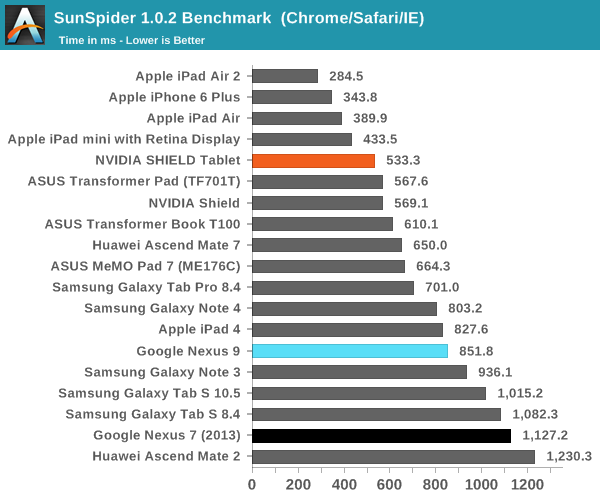
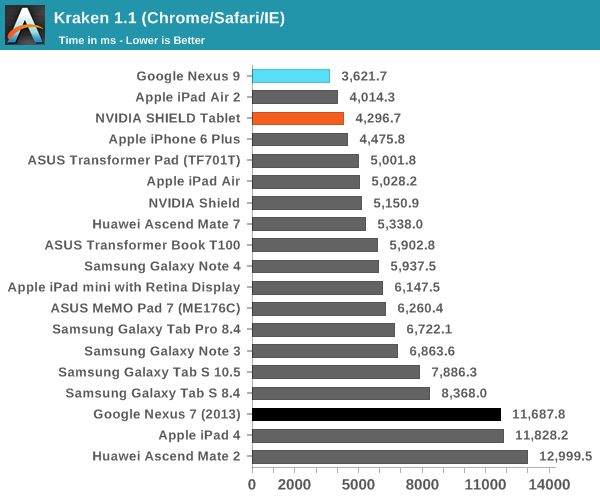
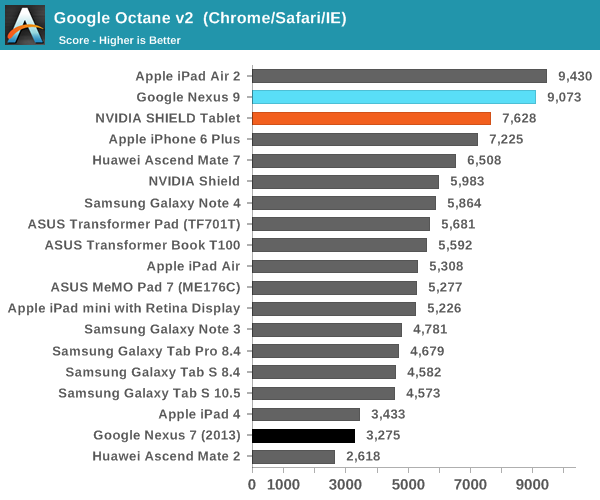
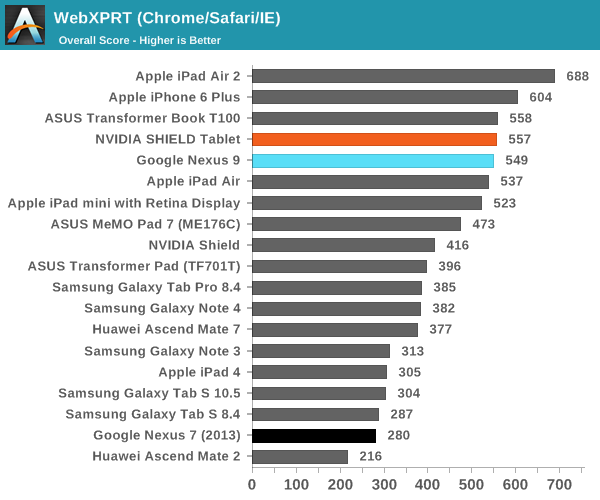
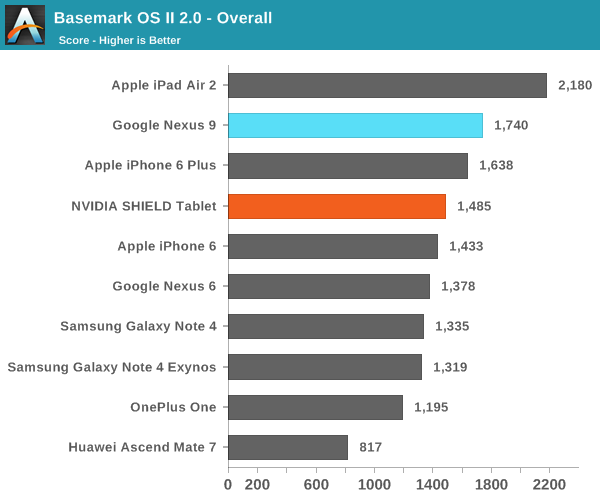
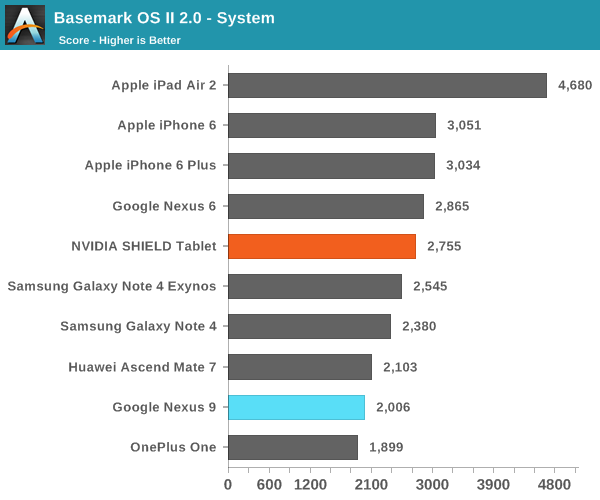
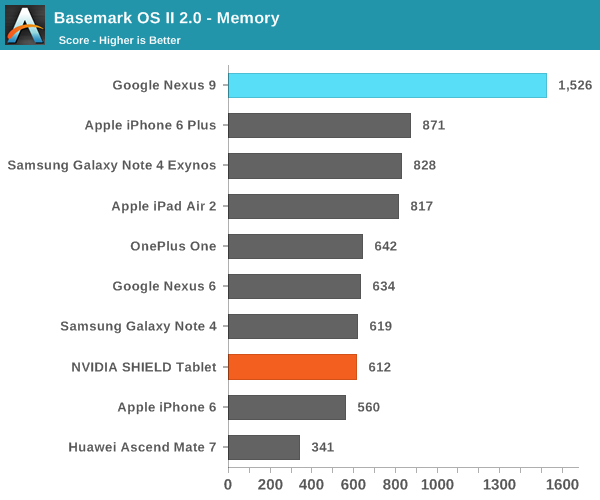
The Basemark System test seems to contribute quite strongly to how the Nexus 9 performs in the overall subtest. Given that this is a storage performance benchmark, it's likely that Basemark OS II has issues similar to Androbench on 5.0 Lollipop or that random I/O is heavily prioritized in this test.
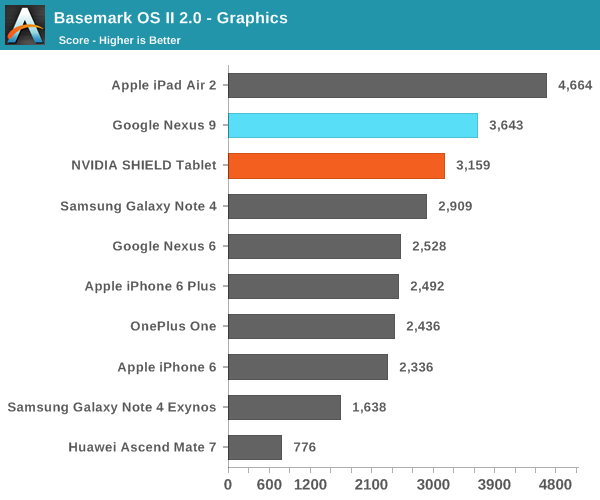
There's a noticeable performance uplift in the graphics test, and although not exactly part of the CPU this does seem at least somewhat plausible as GPU driver updates can improve performance over time.
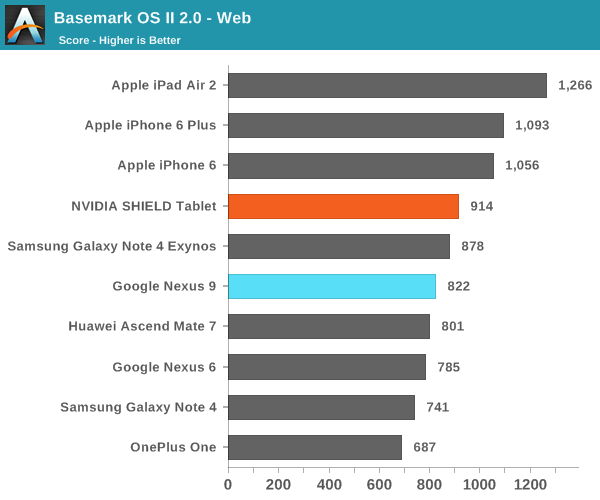
Overall, performance seems to be quite checkered, although improved from our initial evaluation of the Nexus 9. Unfortunately, even in benchmarks where the DCO should be able to easily unroll loops to achieve massive amounts of performance, we see inconsistent performance in Denver. This may come down to an issue with the DCO, or even more simply the fact that Denver is spending more time than it would like to directly executing ARM code as opposed to going through the DCO.
In this case looking at the SunSpider and Kraken javascript benchmarks offers an interesting proxy case for exactly that scenario. SunSpider on modern CPUs executes extremely quickly, so quickly that the individual tests are often over in only a couple of dozen of milliseconds. This is a particularly rough scenario for Denver, as it doesn’t provide Denver with much time to optimize, even if the code is run multiple times. Meanwhile Kraken pushes many similar buttons, but its tests are longer, and that gives Denver more time to optimize. Consequently we find that Denver’s SunSpider performance is quite poor – underperforming even the A15-based Tegra K1-32 – while Denver passes even the iPad Air 2 in Kraken.
Ultimately this kind of inconsistent performance is a risk and a challenge for Denver. While no single SoC tops every last CPU benchmark, we also don’t typically see the kind of large variations that are occurring with Denver. If Denver’s lows are too low, then it definitely impacts the suitability of the SoC for high-end devices, as users have come to expect peppy performance at all times.
In practice, I didn't really notice any issues with the Nexus 9's performance, although there were odd moments during intense multitasking where I experienced extended pauses/freezes that were likely due to the DCO getting stuck somewhere in execution, seeing as how the DCO can often have unexpected bugs such as repeated FP64 multiplication causing crashes. In general, I noticed that the device tended to also get hot even on relatively simple tasks, which doesn't bode well for battery life. This is localized to the top of the tablet, which should help with user comfort although this comes at the cost of worse sustained performance.










169 Comments
View All Comments
techcrazy - Friday, February 6, 2015 - link
Best Nexus 9 review i read. Excellent work anandtech team.RobilarOCN - Friday, February 6, 2015 - link
How does the Tab S fall short of the Nexus 9? I've owned both. Video playback battery life overwhelmingly supports the Tab S, it has a far superior screen (AMOLED...), It has a micro SD slot, it has the ability to connect to HDMI via MHL adapter. The only way the Nexus 9 can output video as it has no available adapter and no onboard MHL support is via 3rd party such as the Chromecast. The 16GB Nexus 9 and 16GB Tab S 8.4 are in the same price range but of course you can expand the memory on the Tab S via a micro SD card. The 32GB Nexus 9 sits in the same price range as the Tab S 10.1 and again the 10.1 can have cheap memory added to it.The only places the Nexus 9 wins is if you want a 4:3 format (and in that case the first gen IPad Air 64GB is cheaper and a better device) or if you absolutely have to have Lollipop which will eventually get to the Tab S.
UtilityMax - Sunday, February 8, 2015 - link
In my opinion Tab S will be eventually remembered as a flop. Yes, it has a great wide screen and good battery life for video playback. So it's great for watching videos, which is why I bought one (and would buy it again). Unfortunately, videos is the only thing that Tab S does truly well. The Tab S forums on the web are filled with discussions about "lag" and why Chrome can be so slow. For a flagship tablet, the CPU/GPU performance scores could have been a little better, and the standby as well as web browsing battery life could be A LOT better. The other day I was stuck in a library for hours with this tablet and came to realization that I am not sure if this thing can last for 5 hours of web browsing on a full battery charge, which is horrendous. I have a Samsung laptop with a quad core i7 CPU and 17 inch screen that could work longer on a battery charge.Basically, this tablet gives you a great screen, SD card slot, good build quality, and not much else. I am still glad I got a 10.5 Tab S on a sale for $400. However, I don't think it's really worth the "regular" price of +500 dollars.
Impulses - Monday, February 9, 2015 - link
5 hours? Yikes... My Atom netbook from half a decade ago could manage that...UtilityMax - Sunday, February 15, 2015 - link
But amazingly, the Tab S 10.5 can play a 720p video for something like 10 hours on a full charge. Go figure.mkozakewich - Friday, February 6, 2015 - link
Those NVidia charts obviously show the IPC measured in a 'ratio'. They're not going to tell us what exact IPC they get.So yeah, the highest it goes is less than 2.0, which means their IPC for optimized code isn't quite double the performance of regular ARM stuff. I'd suppose the regular code could get up to 3 IPC, which means the optimized stuff could get up to 6 IPC (out of the maximum 7). It seems to check out.
I'd have expected you not to throw caution to the wind when reading first-party benchmark slides.
flamingspartan3 - Friday, February 6, 2015 - link
The Nexus 7 2013 is still competitive in many of these benchmarks. It's remarkable how great the device is even after almost two years.UtilityMax - Sunday, February 8, 2015 - link
The criticism that there aren't enough apps for the big screen is somewhat misplaced. I suspect that web browsing, videos, ebooks, and productivity apps are the prime applications for the large screen tablets. Why bother with the facebook app, when you can just login into facebook from chrome, and with the biggish screen have access to the full facebook web site?Impulses - Monday, February 9, 2015 - link
Chrome alone probably accounts for like 80% of my tablet use (and I've had an Android tablet since the OG TF) seems that's not necessarily the norm tho...Jumangi - Monday, February 9, 2015 - link
Then why pay for a device with such high end components like the K1 SoC if your just gonna use the browser? Maybe this is what some do because the android marketplace is so limited for large tablet apps but doesn't mean its ok.